In this blog entry, I'm covering 2000 to 2005 Toyota MR2 Spyder (MR-S in some part of the World). In Malaysia, Toyota MR2/MR-S is freaking RARE as it was NOT OFFICIALLY IMPORTED by UMW Toyota. Hence, ALL MR2/MR-S you see on Malaysian roads were GREY or PERSONAL Imports. There were less than 200 units of MR2/MR-S throughout Malaysia.
Above: JDM Toyota MR-S with TRD Bodykit stage 2.
Below: with TRD Bodykit Stage 3 + Hardtop.
Here are the used prices of Toyota MR2/MR-S in Malaysia:
Year: 2000....2001......2002......2003......2004......2005 (Unreg)
RM:... 88k.....96k........105k.......115k........125k.........140k
It's HARD for me to find a unit to test drive and brag about it since this car is SO RARE in Malaysia. ALL is NOT LOST, I dished out a COMPREHENSIVE review from GOAUTO Australia, MR2 MKIII Model history, List of Colour and trim choices, and a whooping 11 OWNER'S Review from Carsurvey.org. ENJOY:
SUPERTEST: Toyota MR2 Spyder / convertible
SOURCE: http://www.goauto.com.au/mellor/mellor.nsf/story2/ D40A0C4C125ED651CA256A46008084E2
Toyota MR2 Spyder / convertible
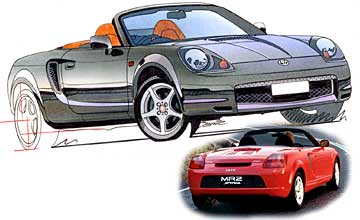
Overview

Yes, it remains a two-seater with mid-mounted engine and rear-wheel drive, but the MR2 Spyder is the company's first car designed from the outset as a convertible and the first Toyota with a sequential shift semi-manual transmission.
Significantly lighter and cheaper than its predecessor, the Spyder offers real competition to the iconic Mazda MX-5 drop-top.
Model release dates: October 2000 - March 2006
Previous model

Make: Toyota
Model: Toyota MR2 Coupe
Release date:March 1994
End date:December 1999
All were powered by a mid-mounted 2.0-litre engine that produced 125kW and 186Nm.
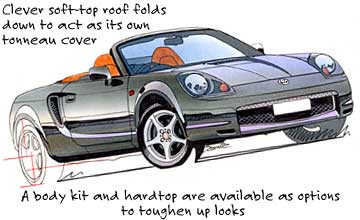
The Car
THE Spyder loses out to its predecessor in looks. The sleek coupe of yore is replaced by a cowl-forward design with extremely short overhangs at each corner. There's more than a touch of Porsche Boxster about the front-end, while the slab sides are only interrupted by large intake ducts for the mid-mounted engine - a traditional MR2 design element.Did you know?
The first drawings of the MR2 Spyder were penned on a napkin at the Tindall RAAF base in the Northern territory by former chief engineer of Toyota's sports car projects, Tadashi Nakagawa. He was at Tindall for the launch of the Celica GT-Four Rallye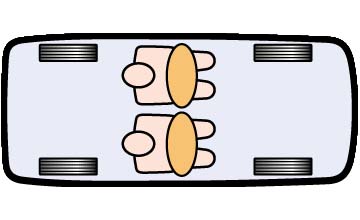
The Car - Seat Plan
THE Spyder is purely a two-seater with the engine mounted in behind the seats and ahead of the rear axle, ensuring quite a "cab forward" feeling. As is traditional for two-seaters, luggage and storage space is limited. Toyota claims the convertible roof can be manually opened and closed in less than 60 seconds - a claim we can back up. A neat touch is the that the rear window is glass rather than plastic, ensuring better quality visibility.The Car - Seats
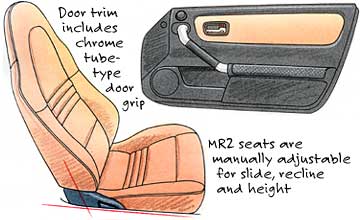
MR2's sports seats come standard with a two-tone cloth trim, although
a tan leather seat trim and roof cover is an option. The seats feature
Toyota's WIL (Whiplash Injury Lessening) design and are designed to
suit adults up to 190cm tall. The hip point has been lowered compared
with the superseded MR2 while seat cushion firmness and damping
have been increased. The passenger seat's leading edge has been
tilted upwards 1.5 degrees to maximise hold.
The Car - Dash
presented in true sports car-style, with the tachometer taking pride of
place in the centre. A digital gearshift indicator is incorporated into
the tacho housing. The stalks are standard Japanese fare with the
indicator mounted on the right and the windscreen wiper on the left.
Did you know?
Soft-top sports cars account for approximately 13 per cent of theAustralian sports and coupe segment.
The Car - Controls
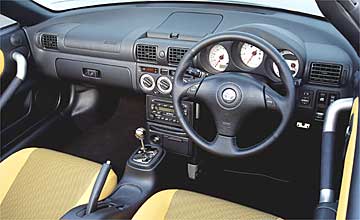
TOYOTA describes the interior of the Spyder as "retro/sports", although
the controls design theme seems to be more mish-mash. Some items
are designed for application in the MR2, others sourced from that great
Toyota parts bin. But in typical Toyota fashion, it's usually logical and
easy to use - the indicator stalk is on the right and also controls the lights
for instance. The toughest challenge will be adjusting to the gearshift
action - either using the floor-mounted lever or the buttons on the
steering wheel.
The Car - Wheels/tyres
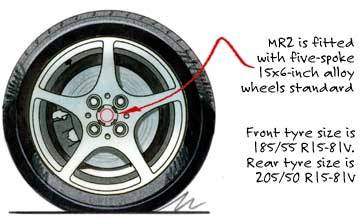
THE Australian-specification Spyder is fitted with either Bridgestone Potenza RE0140 or Yokohama Advan A043 tyres. Considering how
tight space is, it's no surprise the MR2 employs a space saver spare tyre.
Did you know?
A Sportivo body kit is available for the Spyder as an official Toyota Accessory. The kit consists of a front spoiler, side skirts, rear skirt and rear wing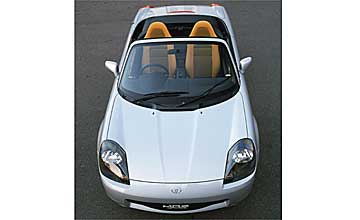
The Car - Luggage
TOTAL luggage capacity is a miniscule 140 litres, spread through four compartments, but it cannot fit a normal briefcase or golf bag in any of them. The Spyder's main luggage compartment is situated behind the seats.Did you know?
Toyota claims the main luggage compartment behind the seats can accommodate a "slimline" 20cm circumference golf bag.The Car - What's changed
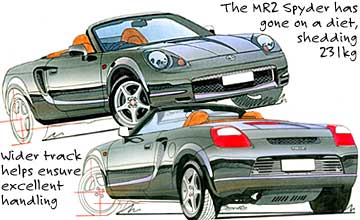
A LOT has changed, that's what. Toyota went back to basics for the
third MR2, gave the car a hair-cut, lopped some weight off it and
gave it a squarer look and stance. The result may not be as pretty
inside or out, but it seems to be effective in its primary role - thrills
for the fan of open-top motoring on a budget. Not everything works
of course. The gearshift is gimmickky and the looks - from the front
in particular - are derivative.
Did you know?
Accessories for MR2 include a removeable hardtop, polycarbonate headlight covers, carpet floor mats and mudflaps.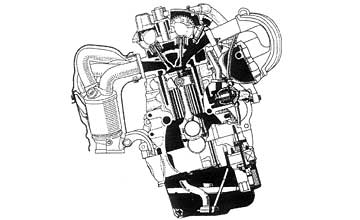
The Car - Stand out features
SMILES per mile is what the MR2 is all about. Combining Toyota'sability to build fuss-free motor cars and - when the mood takes it -
to put some sparkle into them as well. The mid-engine roadster is
a fun road-burner with a touch of schizophrenia about it: tough when
you want it to be, but also relaxed enough to cope with city traffic.
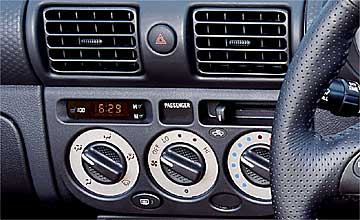
The Car - Climate control
THE major shock is that the air-conditioning - other than the type you get when you drop the roof - is not standard in the Spyder. Secondly, having forked over the extra cash, you don't even get a climate control system. That's right: it's a manual type, just like you'd get in a $16,000 Toyota Echo.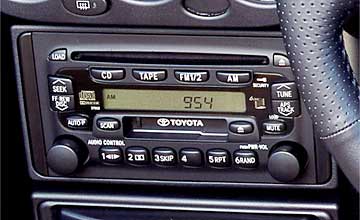
The Car - Sound system
THE Spyder comes standard with six-CD in-dash audio system, which also includes AM/FM radiuo cassette with four speakers. Features include door-mounted tweeters, auto reverse, seek, scan, key off pinch roller, radio played when tape in FF or rewind mode and Dolby B noise reduction. The CD player's features include scan, repeat and random play.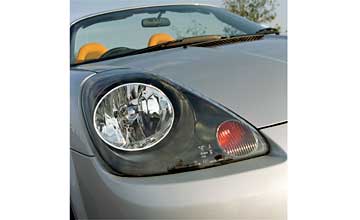
The Car - Security
SPYDER has an engine immobiliser, security alarm with panic mode and wireless door locks. The bonnet opener is concealed in the lockable glovebox. A combined engine hood opener and fuel lid opener valet lock is also provided.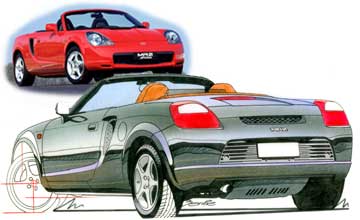
Our opinion
 We like: Back to basics, light-weight, sharp handling
We like: Back to basics, light-weight, sharp handling  Room for improvement: Fussy semi-automated gearbox, lack of luggage space,
Room for improvement: Fussy semi-automated gearbox, lack of luggage space,slabby looks
By BRUCE NEWTON 15/05/2001
THIS might be the third generation MR2, but there's also a few firsts here.
The first Toyota designed from inception to be a convertible, the first Toyota with sequential-shift manual transmission and perhaps most importantly, a lot more in common with the first generation MR2 than the second.
That first MR2 was a small, mid-engined coupe which exploited light weight and dynamic ability to surprise and delight drivers with a sporting bent.
The second generation car was bigger, heavier, more powerful and more expensive, and its audience shrunk as the price blew out to around $60,000.
Now, minimalist is back in fashion. The engine has shrunk in size, the pricetag has dropped significantly and the car even appears truncated compared to its swooping predecessor. There's also been careful attention paid to equipment levels. For instance, air-conditioning is an option!
With peak power of 103kW, the Spyder's 1.8-litre four-cylinder engine is 10kW down on the latest Mazda MX-5, but at 975kg it's more than 100kg lighter and therefore right in the ballpark when it comes to power to weight.
And there's plenty of familiarity with the MX-5 experience when you drop the top and go for a burn down a winding country road in the Spyder.
The grip of the front-end and the feel communicated back through the steering wheel are excellent, as is the accuracy of the steering. The only thing that takes some time to get used to is the rear-end which can feel a little floaty, but you soon realise it's going to stick - unless you are really pushing very hard.
The package does deteriorate when the going gets bumpy and rutted, however. There's a tendency for tram-tracking and the front-end can struggle to retain controlled contact with the bitumen. Throw bumps in when you're braking heavily or jumping on and off the throttle and you can feel the Spyder getting a little confused.
Then there's the clutchless manual gearbox. The downshifts are simply superb, complete with a computer-generated blip on the throttle as you engage the gear. Upchanges, however, are too slow particularly if you choose to leave your foot flat on the accelerator.
You really need to lift just as you're pulling the higher gear and then it's noticeably smoother and quicker.
Several members of our test team have commented that the second and third gear ratios seem a little too wide for attacking driving on winding roads. Second will run out of puff just too soon, third seems just too tall. And the gearbox's computer management system will not let you shift down early and use some engine braking if it calculates you are going to over-rev the engine.
Instead, you have to rely on the disc brakes equipped with anti-lock - handy that they are strong on power and feel - to slow you for corners. Only when the revs have died away can you change down and boot the car through the corner.
Oh for a manual gearbox!
That's not such a cry around town where the lack of a clutch pedal is a help rather than a hinderance, although the ability to go full auto in town would probably be the best solution.
And forget about the E-shift buttons on the steering wheel, the gearlever is much easier to use.
All the while, growling away behind your left ear is an eager, hard-revving and smooth little engine - an obvious aural indication that the MR2's traditional mid-mounted engine layout has been retained.
It's an enthusiastic if reasonably noisy little twin cam 16-valve unit which employs variable valve timing technology (VVTi is what Toyota calls it) to deliver honest and flexible performance over a reasonably wide range.
Independent testing has shown that the MR2 Spyder accelerates to 100km/h in about 8.8 seconds and zips through the quarter mile in about 16.4 seconds. That's right in the ballpark for this category.
Moving inside the cockpit and the presentation is a curious mix of sports car theme and Toyota parts bin. There's chrome rings around the air-conditioning dials, black on silver instrument dials with the tacho centrally mounted, that silver knob of a gearshift lever and comfortable body-hugging sports seats.
Yet the audio system head unit is from the styling house that brought you Camry - nothing bespoke there. The presentation is dark, the plastics quite hard and the silver tubing mounted as door grabs could be from your grandmother's bathroom.
On the more practical side, storage space is extremely limited. The front "boot" is a joke, the sliding compartment behind the seats struggles to accommodate a briefcase such are the impracticalities of its shape and the door pockets are only good for a mobilephone.
On the flipside, the glovebox is commodious and you get three cupholders - in a two passenger car.
But the real test of a convertible is the roof. It's a manual system which is easy to use and earns more points for having a glass rear window. With the top down, windows up, the pop-up wind breaker in place and you nestled down into the low seating position this is a cosy environment in which to go for a blast.
It looks good too, a trait not all convertibles can boast when the top's lopped or added back on. In fact, as has been commented far and wide, there's more than a little Porsche Boxster to the styling.
And, happily, there's just a little Boxster in the drive experience too.
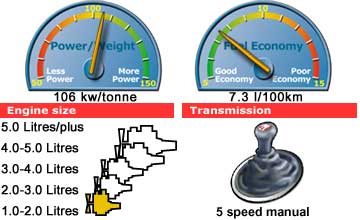
Mechanical
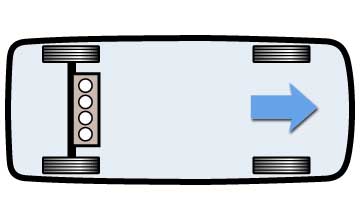
Mechanical - Plan views
THE MR2 Spyder employs a similar, bespoke mechanical drivetrain as the Porsche Boxster, its transverse four-cylinder being mid-mounted for good weight distribution and driving the rear wheels.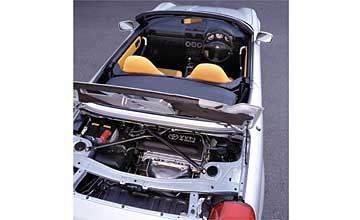
Mechanical - Engine
THE MR2 Spyder is powered by an all-alloy 1794cc VVTi-equipped twin cam multi-valve engine which delivers 103kW of power at 6400rpm and 170Nm of torque at 4400rpm. VVTi means the engine offers computer-controlled variable valve timing across the engine revolution range with the aim of producing enhanced driveability.Did you know?
The engine actually boasts less power than the old car, but that's compensated for by the 231kg lighter kerb weight.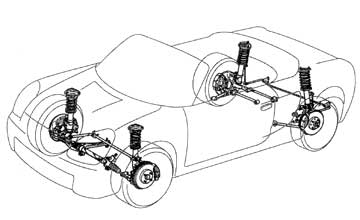
Mechanical - Suspension
MR2's suspension has been redesigned and recalibrated. The MacPherson strut front suspension has a forged L-shaped lower arm, integrated with the lower ball joint, to optimize suspension rigidity and minimize unsprung weight. The rear MacPherson strut suspension has dual lower link arms and a lateral control rod. Stabiliser bars are fitted front and rear.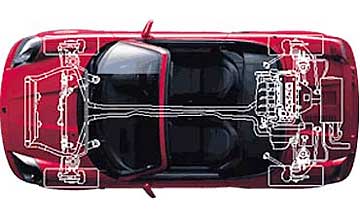
Mechanical - Electronic system
THE acclerator pedal and gearshift of the MR2 are "control-by-wire" type. Two separate electronic control units are networked to ensure smooth co-operation between the engine and transmission. The transmission ECU begins operation as soon as the the driver's door is opened, via a signal from the courtesy light switch.
Mechanical - Transmission
THE MR2 uses a sequential type manual transmission. The lever is pushed forward to change down and pulled back to change up. Gears can be shifted using either a short-throw gear lever or E-shift buttons on the steering wheel. Although there is no clutch pedal, the five-speed gearbox is a manual transmission. The clutch operation has simply been automated. Engine start is only permitted when the brake pedal is depressed and the shift lever is in neutral. The transmission ECU controls the clutch change, even closing the throttle momentarily during an up change if the driver's foot is flat to the floor. The ECU also blips the throttle on a downchange to match engine and road speed.Did you know?
There is no automatic "D" mode, which means the driver must always change gears, except when stopped. Then the car automatically shifts into first gear.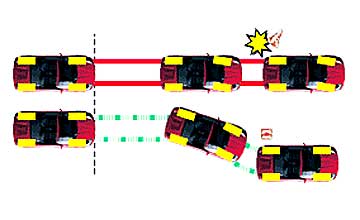
Mechanical - Brakes
THE MR2 Spyder employs ventilated discs with single pistons and floating callipers front and rear. This is mated to four-sensor, four-channel anti-lock braking (ABS) system. Toyota claims the stopping distance has been reduced by 13 per cent compared to its predecessor.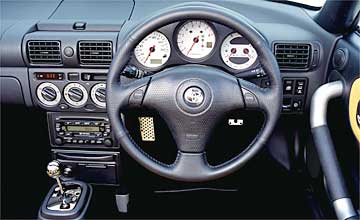
Mechanical - Steering
THE steering system is rack and pinion, combined with Toyota's unique electro-hydraulic power steering. The power steering system is road-speed sensitive, designed to suit mid-ship engine installation and tuned to provide maximum assistance at parking speeds.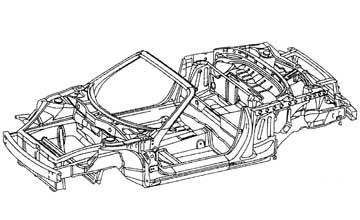
Safety
Dual SRS airbags and pre-tensioning seatbelts with force limiters are standard. Toyota claims the Spyder passes the European 40 per cent offset deformable barrier test and side impact test at much higher impact speeds than the regulations required. The Spyder makes extensive use of high-tensile steel sheet, including the front bonnet, engine hood and door skins, and for the full length of the chassis rails.Did you know?
Impact absorbing structures at the front, side and rear of MR2 include protection beams in doors and reinforcements to the rear upper members and rear side members.RIVALS:
| TOYOTA MR2 SPYDER | MAZDA MX-5 | MGF 1.8i |
| PRICE - RETAIL (Accurate at time of publishing) | ||
| $46,200 | $43,485 | $42,270 |
| TRANSMISSION | ||
| 5-speed sequential manual | 5-speed manual | 5-speed manual, 5-speed auto |
| DRIVING WHEELS | ||
| Rear | Rear | Rear |
| ENGINE | ||
| 1.749 litres DOHC 16V, 4-cyl | 1.839 litres DOHC 16V, 4-cyl | 1.796 litres DOHC 16V, 4-cyl |
| MAX POWER | ||
| 103kW | 113kW | 90kW |
| LENGTH | ||
| 3885mm | 3975mm | 3910mm |
| WIDTH | ||
| 1695mm | 1680mm | 1630mm |
| HEIGHT | ||
| 1240mm | 1225mm | 1260mm |
| WEIGHT | ||
| 975kg | 1085kg | 1075kg |
Data
- Three years/100,000km
- Service intervals: 10,000km/12 months
WARRANTY:
- 1.794-litre DOHC 16-valve transverse mid-mounted petrol four-cylinder with variable valve timing
- Induction: Electronic fuel-injection
- Bore/Stroke: 79.0mm x 91.5mm
- Compression ratio: 10.0:1
- Power: 103kW at 6400rpm
- Torque: 170Nm at 4400rpm
ENGINE:
- Five-speed sequential manual
TRANSMISSION:
- Front: Independent by MacPherson struts with lower L-arms, coil springs, gas shock absorbers and ball joint mounted stabiliser bar
- Rear: Independent by MacPherson struts, dual-link lower arms with control rod, coil springs, gas shock absorbers and ball joint mounted stabiliser bar
SUSPENSION:
- Electro-hydraulic power assisted rack and pinion
- Turns lock to lock: 2.62
- Turning circle: 10.0 metres
STEERING:
- Length: 3885mm
- Width: 1695mm
- Height: 1240mm
- Wheelbase: 2450mm
- Track front: 1475mm
- Track rear: 1460mm
- Fuel tank: 48 litres
- Kerb weight: 975kg
DIMENSIONS:
TOP SPEED: 180km/h limited - JDM Specs. (215km/h Elsewhere)
END OF SOURCE 1: GOAUTO Australia.
Toyota MR2 MKIII History
SOURCE 2: http://mr2wiki.com/AllModels/History
2000
The all-new 2000 MR2 Spyder two-seat roadster was capable ofdelivering a level of acceleration, braking and maneuverability that
came very close to vehicles pegged at nearly twice its price.
Weighing in at 2,195 pounds, the MR2 Spyder rode on a wide,
low-slung platform, supported by MacPherson struts at all four corners.
It had a wheelbase of 96.5 inches and an overall length of 153 inches.
The Spyder was powered by a 1.8-liter twin-cam 16-valve four-cylinder
engine which featured VVT-i cylinder head technology. Rated at 138-hp
at 6,400 rpm and 125 lb-ft of torque at 4,400 rpm, the Spyder's favorable
power-to-weight ratio contributed to a zero-to-60 acceleration time of
6.95 seconds. Power was applied to the rear wheels through a five-speed
manual transmission.
The Spyder's coachwork features steel panels that are bolted onto a
high-rigidity unit-body, making repairs and customization easier and
less expensive. There were storage compartments under the front
hood and behind the seatbacks. The center cluster console was
designed to accommodate audio equipment, or could be removed
completely. The manually operated convertible soft-top folded completely
out of sight, and needed no tonneau cover, unlike most convertibles.
The MR2 offered six exterior color choices and three interior color
combinations. The list of standard features was extensive and the
only options were dealer-installed accessories.
2001
For 2001, the MR2 Spyder carried over with no new changes.2002
The 2002 MR2 Spyder is available with a clutchless sequential manualtransmission (SMT). The MR2 Spyder is the first U.S.-market Toyota
model to feature this new, sophisticated transmission. The clutch pedal
and gear selector have been replaced with a single shifter. The SMT
clutch and gear selector operations are performed by ECU computer
controlled actuators and the engine is also equipped with electronic
throttle control to allow the ECU to reduce torque during shifts. Spyders
equipped with this new transmission also come with cruise control.
2003
In 2003 the MR2 received several updates. The front and rear bumperswere revised, in addition to new headlights, taillights, and side vents.
The chassis also received additional bracing and a limited-slip
differential was available as an option. Wheels and tires were also
slightly increased in size.
2005
The MR2 Spyder is discontinued in America (along with the Mk VIICelica at the same time). No replacement is announced. It's sold for
another year in the UK, where it also gets a special limited edition
model.
NOTE: All chronology dates are model year, unless noted
otherwise. CY refers to "Calendar Year."
END OF SOURCE 2.
SOURCE 3: http://www.carsdirect.com/toyota/mr2_spyder/colors
Colour and trim choices.
| Absolutely Red |
| Black |
| Electric Green Mica |
| Paradise Blue Metallic |
| Phantom Gray Pearl |
| Silver Streak Mica |
| Solar Yellow |
| Spectra Blue Metallic |
| Super White |
| Black |
| Gray |
| Red |
| Tan |


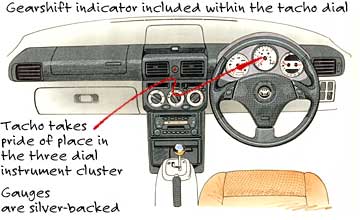
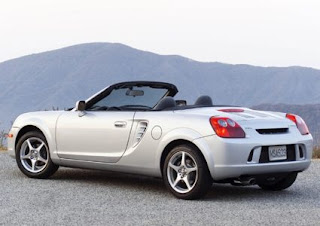

nice to have sourced the materials!
ReplyDeletegreat work!
koolspyda
spyderclub.msia
You blog shares an excellent information about car parts.
ReplyDeleteKeep it up.
The Toyota is one of the best and largest automobile manufacturer in the word. I think those who own the Toyota cars should also keep the Toyota's Repairing Manuals with them so that they can easily repair their cars all by themselves.
ReplyDelete@RJMAAN you're right, but some repairs aren't meant for us to do ourselves, trust me 🤣 i bought a toyota mk 4 a while ago, these ones seem hard to come by. anyone know if japperformanceparts.co.uk still imports mk 2's from japan?
ReplyDelete